
- 20th November 2025
- Back to All News


On 12 November Local London hosted a Skills and Employment Summit to drive forward an integrated approach to skills and workforce development across our sub-region.
Despite many successes to celebrate, the sub-region’s rapid population growth combined with persistent inequalities underscore the crucial need to tackle barriers constraining people and businesses in boroughs in north east and south east London.
To address this, Local London has placed boosting skills and employment at the heart of its new Vision.

Supported by the Mayor of London and BusinessLDN, the half-day event at City Hall brought together employers, education providers, local authorities, policy partners, and community organisations to explore practical solutions for recruitment, workforce development, and inclusive growth.
With distinguished speakers from government, education, training and business, the summit celebrated local successes and introduced new initiatives that will help thousands more people find good work in the sub-region.
Recently launched Connect to Work and Trailblazers programmes, funded by government, present opportunities for businesses and health sector colleagues to play an active role in helping local people find and stay in work.
While the new Local Skills Improvement Plan (LSIP) will further align education and training with the needs of local businesses, helping people in this part of London to gain the skills they need to benefit from roles on their doorstep.
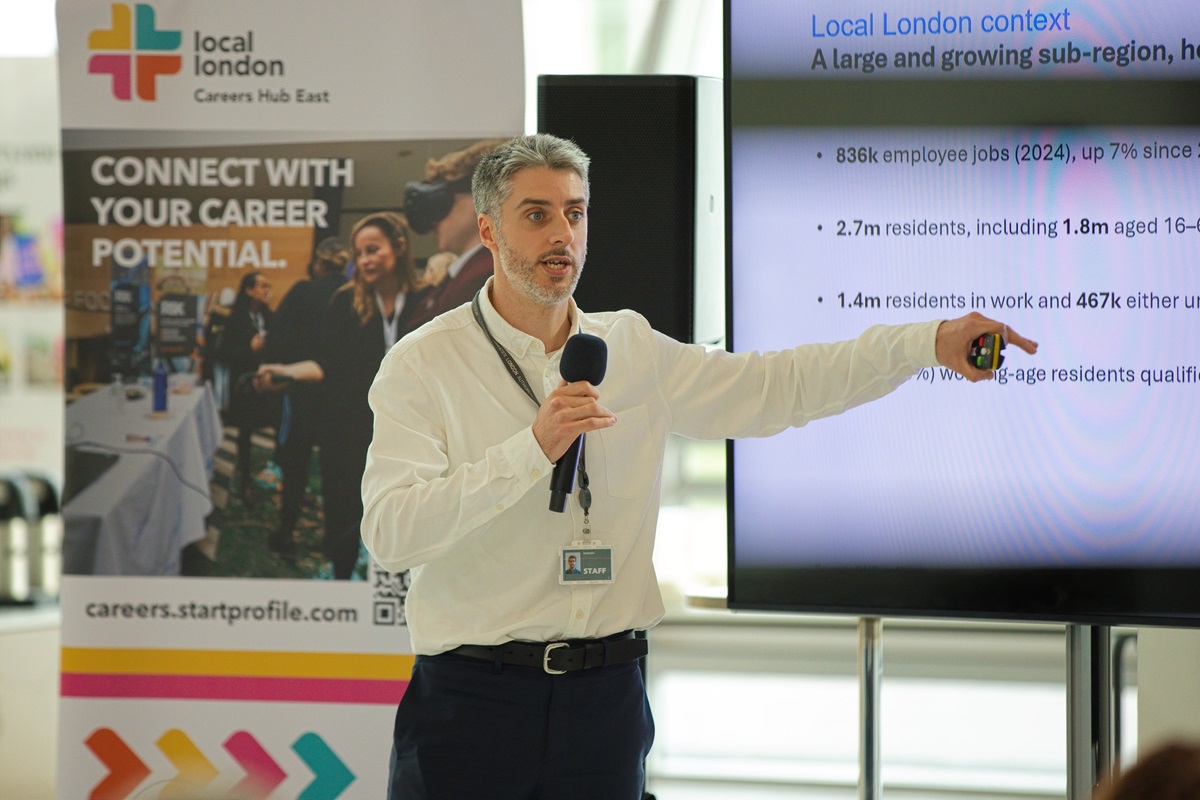

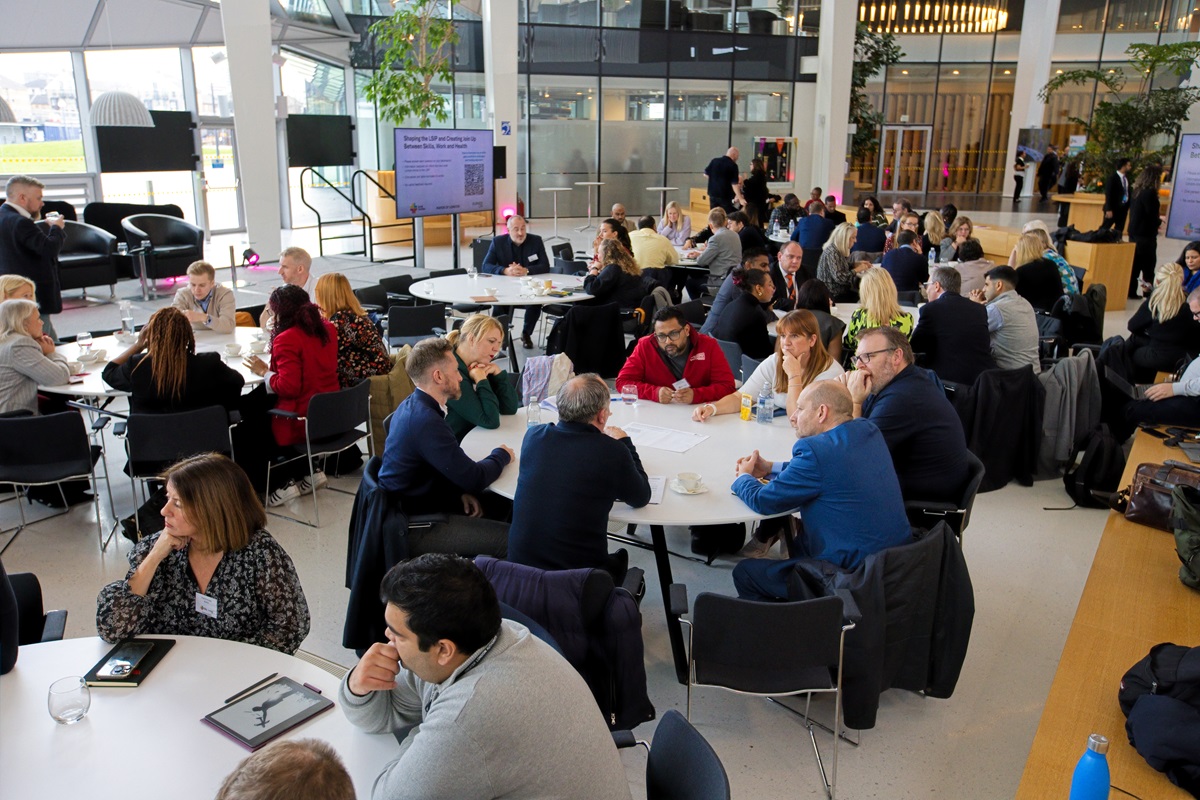
Cllr Ray Morgon, Chair of the Local London Skills and Employment Board and Leader of LB of Havering said “With a population set to exceed 3 million by 2050, there is an urgent need to create an integrated system that serves local people and businesses. We will be launching our Vision for inclusive and sustainable growth later this month and boosting employment and skills is right at the heart of this. To be effective, we need collaboration. Today’s Summit brought together people who can make that change, and we urge businesses, education and training providers, health partners to work with us to develop the cohesive system we need.”
The Local London Vision sets out our plan for the driving sustainable and inclusive employment backdrop of strategies that are catalysing change at a national and London level, including the London Growth Plan and the Inclusive Talent Strategy, and complementing national, London and borough growth and investment plans.
Our thanks to all our brilliant speakers and panellists:

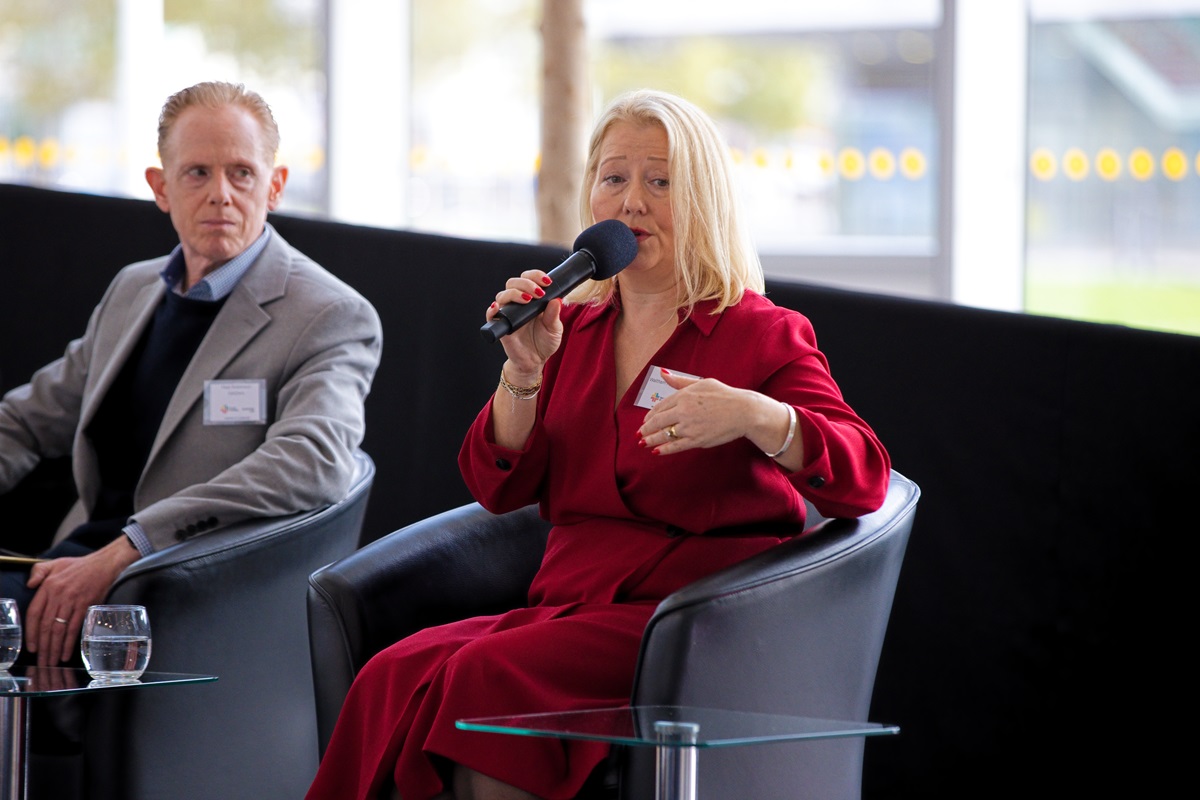



If you would like to be part of delivering our LSIP, get in touch: lsip.locallondon@redbridge.gov.uk

Across our sub-region, we are seeing a huge shift in how training is being designed and delivered.
The immersive learning suites shown in this film, are transforming the way people are learning and teaching skills that meet businesses' needs.
From heat pumps to aerospace, the opportunities for learning and modelling real-world implementation with this technology are endless.
Through this technology and adapting course delivery, colleges and training providers are helping local people and businesses gain the skills they need to meet employers' requirements.
As we begin shaping our new local skills improvement plan (LSIP) for the sub-region we encourage local businesses to become part of the conversation contact: lsip.locallondon@redbridge.gov.uk
Watch the video below to hear from students and staff sharing their experiences of using immersive suites to bring learning to life across a geographical region that extends beyond classroom-based teaching.
The immersive suites are just one of the ways skills teaching is changing in our sub-region. Our year two progress report insert link highlights include:
To help tackle these challenges, we are bringing together stakeholders in the sub-region to implement the findings in our employer-led LSIP and are making the case with partners for the devolution of skills funding.
⇒ Learn more about our LSIP: www.local.london/lsip
⇒ Find out more about how a network of 23 local colleges and training providers are helping local people gain the skills they need here: locallondonskillsproviders.com
Our thanks to Business London for supporting the production of this film, and staff and students at New City College and LSEC for sharing their experiences of learning through the interactive labs.
The immersive learning suites were funded through a successful LSIF bid by the sub-region's Skills Providers Network.
⇒ Watch our webinar about Sector-based Work Academy Programmes (SWAPs)

Since launching ‘Mind the Skills Gap’ our local skills improvement plan (LSIP) for our sub-region, employers and training and education providers in this part of London have been working together to address skills gaps.
With changes happening at pace, our Local Skills Improvement Plan (LSIP) Year Two Progress Report, published today, provides an overview of the progress being made.
The report summarises the achievements being made thanks to the joint efforts of employers, education and training providers and government at all levels, and sets the platform from which further collaboration will develop.
With the development of a new LSIP due to begin at the end of year and published in 2026, now is the opportune time for anyone interested in skills development and how this supports the local economy to read this progress report and get involved in developing training that meets real-world needs.
Cllr Ray Morgon, Chair of the Local London Skills and Employment Board and Leader of LB of Havering said “In our boroughs, we have seen greater progress in growing economic activity than in other parts of London. Through the local skills improvement plan employers and training providers are working together to help people gain the real-life skills they need to find roles they love in local businesses. This significant collaboration is set to grow as we enter the next phase of our local skills planning, and we encourage local businesses to get involved in shaping the future skills landscape.”
Maria Gonella, Managing Partner at Quantum Training said “As both a business and a training provider we appreciate the need for the LSIP and to align training and business requirements from both perspectives. As part of the Local London Skills Providers Network, we are creating new training pathways and opportunities that respond directly to local employers’ needs. We’re getting phenomenal feedback from business owners and staff who are taking on exciting roles and progressing their careers. Working directly with colleges is the most impactful way to ensure upskilling aligns with the trajectory to net zero.”
Asfa Sohail, Deputy Group CEO and Principal, LSEC said “We have a strong network of 23 education and training providers working together to help upskill local people and support businesses through the LSIP by developing a pipeline of skilled talent. Through our successful bid to the Local Skills Improvement Fund we have developed innovative ways of engaging with businesses and their current and future employees, such as our network of immersive teaching labs. Businesses needing to upskill their staff can reach out to the Local London Skills Providers Network for high quality, bespoke training to suit their needs and bridge local skills gaps.”
This second-year progress report offers insights into ongoing initiatives and opportunities for involvement and highlights exciting changes already underway in training and education in our sub-region, including:

Our sub-region is the fastest growing part of the capital and has huge potential for inclusive growth that benefits all our boroughs’ residents. Yet, despite reducing unemployment in our sub-region, it continues to track higher than the national and London averages.
Alongside this, compared to other parts of London, employers in south east and north east London continue to have more pronounced concerns about skills shortages among their existing staff, and worries around skills challenges.
To help tackle these challenges, we are bringing together stakeholders in the sub-region to implement the findings in our employer-led LSIP and are making the case with partners for the devolution of skills funding.
⇒ Learn more about our LSIP: www.local.london/lsip
⇒ Read the Progress Report 2024 for year one
⇒ Watch our webinar about Sector-based Work Academy Programmes (SWAPs)
In March, we were delighted to join partners delivering Local Skills Improvement Plans (LSIPs) across London at Business LDN’s Skills Summit 2025.
Now in its second year of delivery, London’s Local Skills Improvement Plans (LSIPs) are employer-led and data-driven blueprint for aligning training and education with current and future business needs.
The Skills Summit brought together 200 business leaders, education and training providers, government stakeholders and London’s sub-regional partnerships to celebrate the collaboration that employer-led and data-driven LSIPs have created to help close skills gaps across London.
Rt Hon Baroness Smith of Malvern, Minister for Skills, and Mete Coban MBE, Deputy Mayor for London for Environment and Energy addressed the Summit, which explored how businesses, training providers and public sector bodies can progress the transformation of skills and training in London in an era of change and new ambition.
Speaking at the event Forogh Rahmani, Director of Local London outlined the importance of the LSIP for the sub-region: “Our LSIP is the result of research with businesses and stakeholders across our nine boroughs, highlighting five key sectors and eight cross-cutting themes that we are addressing to help close skills gaps. Through the Skills Providers Network, colleges and training providers are responding positively to employers needs, developing courses and learning solutions that make the most of local resources to prepare people across our boroughs for work in high-demand and growing sectors. This is strengthening relationships and ultimately helping people gain the job skills they need to enjoy exciting careers here.”
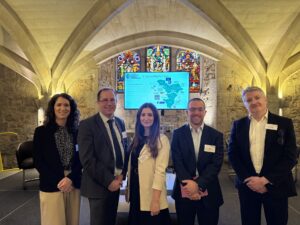
Joined by Chris Burr, Group Director – Partnership and Strategy, and Philip Bourne Digital Consultant from London South East Colleges, we shared what is happening in our boroughs with the pan-London audience. This includes the development of high-tech immersive learning suites implemented across 20 Collaborative Delivery Partners (CDPs) that will help colleges share resources and better prepare learners for work in key sectors.
Attendees also gained valuable insights into the innovative strategies and partnerships that are shaping the skills landscape in the sub-region through the Local London Skills Providers Network.
The LSIP initiative has been confirmed for another three years with a refresh planned for autumn 2025 under the oversight of Skills England, which aims to build a coherent picture of skills gaps across the country and how they can be addressed.
Find out more about our LSIP work: www.local.london/lsip
Watch the film: https://youtu.be/aOAbu9XU1ik
Across the sub-region, partners are working together to help close the skills gaps prioritised in our LSIP (Local Skills Improvement Plan). Whilst we are engaging with employers to ensure that the plan delivers their needs, our partners at the Local London Skills Providers Network are bringing together training and education providers to respond to the LSIP.
Through the network, training and education providers are developing new ways of teaching skills to meet business needs.
This was showcased at the Working at Heights business breakfast hosted recently by Capital City College and the Local London Skills Providers Network for employers in industries where safety at height is critical, ie construction, building maintenance, electrical work, cleaning, and wind turbine operations.

In partnership with 3T, a leading training provider in the global offshore market, Capital City College and the Skills Providers Network have developed a suite of industry-specific courses to address gaps directly supporting LSIP priorities in construction, engineering and green jobs. These include:
The event also included a fascinating tour and demonstration of Capital City College’s state-of-the-art rope access facilities (pictured) and wind turbine maintenance workshop in Enfield, where students gain vital practical experience in maintaining and servicing wind turbines.
This free training offers local people access to hands-on upskilling opportunities in the growing green jobs sector that align both with our LSIP priorities and the UK Government’s net-zero targets.
Discover our LSIP for the sub-region
Discover the Local London Skills Providers Network

We recently hosted the second in a series of webinars designed to support micro, small and medium-sized businesses in London to find and develop existing talent.
Over 70 people joined the online session which focused on Sector-Based Work Academy Programmes (SWAPs), an initiative helping employers bridge skills gaps while providing jobseekers with essential training and employment opportunities.
The event was highly interactive. Attendees from businesses across London, public sector and education partners posed live questions to a panel of experts representing all perspectives of this collaborative approach to addressing employers’ skills needs, including:
“It was an excellent webinar. My knowledge of SWAPs has increased, and it was great to hear the success stories of the SWAP” commented one attendee after the event.
The webinar was delivered as part of the Local Skills Improvement Plan (LSIP), a pan-London strategy funded by the Department for Education and delivered by Business LDN in collaboration with London’s four sub-regional partnerships (SRPs): Local London, South London Partnership (SLP), Central London Forward (CLF), and West London Alliance (WLA).
The London LSIP aims to create employer-led training initiatives that address workforce development needs across the capital.
Join South London Partnerships and South London Careers Hub to explore: How do we give young people meaningful experiences of the world of work and inspire the next generation? Book your place at the next FREE webinar in the series.
For more information on upcoming webinars and workforce development initiatives, explore our website or get in touch with lsip.locallondon@redbridge.gov.uk if you would like access to the webinar recording.
We recently hosted the second in a series of webinars designed to support micro, small and medium-sized businesses in London to find and develop existing talent.
Over 70 people joined the online session which focused on Sector-Based Work Academy Programmes (SWAPs), an initiative helping employers bridge skills gaps while providing jobseekers with essential training and employment opportunities.
SWAPs can create a skilled workforce for businesses of any type. Employers and training providers create short sector-specific upskills training programmes for unemployed people, giving them the right skills to find jobs in that sector.
The event was highly interactive. Attendees from businesses across London, public sector and education partners posed live questions to a panel of experts representing all perspectives of this collaborative approach to addressing employers’ skills needs, including:
“It was an excellent webinar. My knowledge of SWAPs has increased, and it was great to hear the success stories of the SWAP” commented one attendee after the event.
The webinar was delivered as part of the Local Skills Improvement Plan (LSIP), a pan-London strategy funded by the Department for Education and delivered by Business LDN in collaboration with London’s four sub-regional partnerships (SRPs): Local London, South London Partnership (SLP), Central London Forward (CLF), and West London Alliance (WLA).
The London LSIP aims to create employer-led training initiatives that address workforce development needs across the capital.
Join South London Partnerships and South London Careers Hub to explore: How do we give young people meaningful experiences of the world of work and inspire the next generation? Book your place at the next FREE webinar in the series.
For more information on upcoming webinars and workforce development initiatives, explore our website or get in touch with lsip.locallondon@redbridge.gov.uk if you would like access to the webinar recording.
Discover our latest newsletter and Skills Special www.local.london/news/newsletter
Our Local Skills Improvement Plan (LSIP) Progress Report, published today, provides an update on how businesses and training providers are working together to bridge major skills gaps in our sub-region.
Great strides have been taken in the first year since the launch of ‘Mind the Skills Gap’ our plan for improving skills across our sub-region. Support from employers, education and training providers and government at all levels has ensured that recommendations in the plan are being realised.
Anyone invested in skill development and implementation efforts and how these support the wider economy in Local London will want to read this progress report and get involved in developing training that meets career needs.
⇒Read the Progress Report 2024 for year one
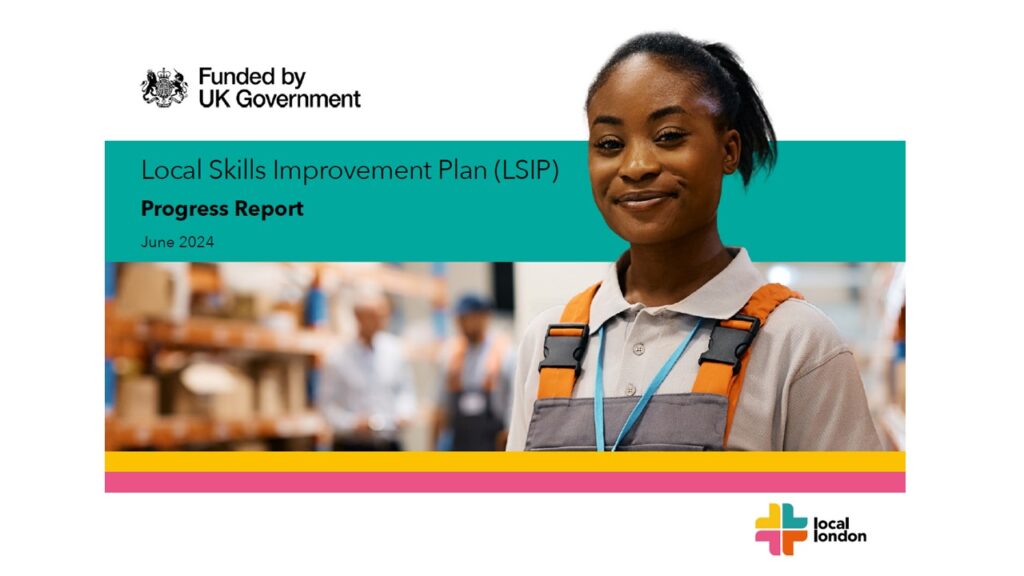
This first year progress report offers insights into ongoing initiatives and opportunities for involvement and highlights exciting changes already underway in training and education in our sub-region, including:
Our sub-region is the fastest growing part of the capital and has huge potential for inclusive growth that benefits all our boroughs’ residents. Yet, unemployment in our sub-region tracks higher than the national and London averages.
Alongside this, compared to other parts of London, employers in south east and north east London continue to have more pronounced concerns about skills shortages among their existing staff, and worries around skills challenges.
To help tackle these challenges, we are bringing together stakeholders in the sub-region to implement the findings in our employer-led LSIP and are making the case with partners for the devolution of skills funding.
‘Mind the Skills Gap’ our LSIP for this part of London, and this year one progress report have been created for a diverse audience with an interest in aligning skills and training provision with employers’ needs. This includes employers and businesses in the sub-region who are already involved, as well as those who have yet to engage with the LSIP.
Reflecting research into skills needs across our nine boroughs, our LSIP is part of the pan-London LSIP produced by Business LDN in September 2023 for the Department for Education. Priority needs for addressing skills shortages in this part of London centre around five key sectors:
Our research also identified eight shared themes: green skills; digital skills; support (including ESOL); skills provision; information and advice; cooperation and engagement; funding; and tackling inequality.
Learn more about our LSIP: www.local.london/lsip
Local businesses are encouraged to engage with the Local Skills Improvement Plan (LSIP) for the Local London sub-region by assessing their workforce development needs in alignment with LSIP objectives.
We openly invite businesses to participate in recruitment fairs and careers events across our boroughs, as well as inspiring students to broaden their career aspirations as ‘enterprise advisers’, ensuring these efforts are consistent with the LSIP’s strategic goals.
Through our extensive network of colleges and training providers, we facilitate potential partnerships and collaborative programs with employers aimed at addressing local skills gaps.
Discover more about how we work with businesses: www.local.london/businesses
Watch our video to learn more about becoming an enterprise adviser:
Colleges, training providers and technical institutes will find a comprehensive overview of the work to date to develop courses and facilities that better meet developing employer-needs in this progress report.
For further information, visit: www.locallondonskillsproviders.com
To help tackle unemployment across the Local London sub-region, we have produced a series of guides to help older residents explore their career options.
Whether looking to change sectors, retrain or start a career, the ‘50 Forward’ leaflets provide an insight into priority job sectors with vacancies in our nine boroughs, and aim to get local people into well-paid, long-term work.
Taking its name from the growing need to support people aged 50 and over to return to work, or change sectors, the ‘50 Forward’ leaflets aim to shine a light on their transferable experience and skills that can be used in new careers and opportunities available in London.
Each of the leaflets in the series focuses on one of five sectors that have large recruitment needs in this part of London, as identified by employers in our Local Skills Improvement Plan (LSIP), namely:
The ‘50 Forward’ leaflets are part of our Integration Hub’s work to connect residents with employers and businesses, and local employment services.
While the leaflets have been designed and co-produced with people aged 50 and over, the information on the sectors could inspire people of any age considering returning to work or changing careers.
Printed copies of ‘50 Forward’ can be ordered via workconnections@redbridge.gov.uk or picked up from any of our borough’s employment and skills services.
To obtain digital copies please visit the Local London Work Connections website.
The site is growing and hosts information and resources to help people get into work, including experienced workers, young people and people with disabilities (physical and/or learning).
New research, funded through the Local Skills Improvement Fund (LSIF) for the Local London sub-region, has highlighted how a lack of knowledge and understanding of the green and digital job sector is preventing people from taking up a wealth of opportunities in the sector.

Figures from the survey of over 1,000 Londoners aged between 16-25-years-old reveal that despite half wanting to pursue a career in the green sector, almost a third (29%) have little to no knowledge of what green skills mean.
Furthermore, they felt there were large barriers to entry including not knowing where to begin (42%) and feeling that they wouldn’t be able to earn enough in the field (37%), while a third (33%) mistakenly believed there were no job opportunities where they lived.
In fact, research by WPI, economic consultancy, highlighted that green jobs in London are set to double by 2030. With many companies struggling to fill vacancies, there are huge opportunities for young Londoners training to enter this workforce.
Welcoming the research Sarah Murray, Director of Local London commented “The findings from this LSIF-funded survey confirm the important role education has to play in preparing young people for the predicted boom in green and digital jobs. We look forward to continuing to work with our partners to ensure training provision meets employers’ needs.”
The government-funded Local Skills Improvement Fund (LSIF) supports local education and training providers to develop and deliver training that directly addresses the needs of local employers and businesses as identified in the sub-region’s Local Skills Improvement Plan (LSIP).
Local London is working with employers across the sub-region’s nine boroughs to ensure the LSIP continues to meet market needs. Much of the work the sub-regional body does to help adults into employment and help young people understand all their career options focusses on these priorities.
From the education perspective, a new investment of £6.5m from the Government’s Local Skills Improvement Fund (LSIF) has been secured by a group of 23 further education, higher education and skills providers in North East and South East London, led by London South East Colleges. This will be used to put local learners in the best possible position to secure jobs in the green and digital sectors.
This investment will see current and future learners across the Local London sub-region benefit from new state-of-the-art facilities, along with the development of new courses and qualifications, new approaches for collaborative teaching, and digital and green skills training for teaching and non-teaching staff.
⇒ Read the full press release on the Green Jobs and Skill Partnership website.
Watch this video developed by the Local London Green Jobs and Skills Partnership, focusing on the lack of understanding around the digital sector and dispelling some common myths and misconceptions.
Watch Louise Wolsey, Group Chief Strategy Officer, London South East Colleges, talk to the news team at London Live here (first broadcast 6 pm 25 April 2024)
⇒ Find out more about the LSIF and the work of the Local London Green Jobs and Skills Partnership